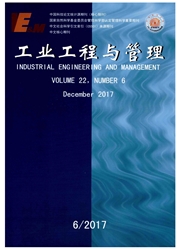

 中文摘要:
中文摘要:
为了分析我国现行的WEEE回收处理相关规制政策对电器电子产品闭环供应链决策的影响,分别构建了政府规制下决策、无政府规制时集中决策和分散决策三种情况下的电器电子产品闭环供应链(CLSC)决策模型,并基于博弈分析方法求得政府规制工具的最优参数和CLSC各成员的最优经营策略以及供应链总利润、消费者剩余和社会福利。结果表明:当政府规定制造商须达到的最低再生利用率超过制造商的最优再生利用率时,虽然能提高制造商实现的再生利用率,但会损害各方利润及社会福利;否则,无论制造商和销售商是否合作,实施政府规制都会提高各方利润及社会福利。
 英文摘要:
英文摘要:
To analyze the effects of Chinese regulation policies about WEEE recycling on closed-loop supply chain(CLSC)decision on electrical and electronic equipments,three kinds of decision-making models are developed respectively for CLSC under government regulations,centralized or decentralized decision without government regulations.Based on game analysis method,optimal parameters of government regulation policy tools,optimal operation strategies of CLSC members,total CLSC profits,customer surplus and social welfare are obtained.The results show that when the minimum recycling rate that decided by the government surpasses the optimal recycling rate of the manufacturer,it would increase the realized recycling rate of the manufacturer,and will damage the profits of manufacturer and retailer,the total profit,the customer surplus and the social welfare.Otherwise,the implementation of government regulation policies is helpful to increase the profits of each member and social welfare,whether under centralized or decentralized situation.
 同期刊论文项目
同期刊论文项目
 同项目期刊论文
同项目期刊论文
 Some Induced Correlated Aggregating Operators with Interval Grey Uncertain Linguistic Information an
Some Induced Correlated Aggregating Operators with Interval Grey Uncertain Linguistic Information an Method for aggregating correlated interval grey linguistic variables and its application to decision
Method for aggregating correlated interval grey linguistic variables and its application to decision A novel SIR method for multiple attributes group decision making problem under hesitant fuzzy enviro
A novel SIR method for multiple attributes group decision making problem under hesitant fuzzy enviro Collective Recycling Responsibility in Closed -Loop Fashion Supply Chains with a Third Party: Financ
Collective Recycling Responsibility in Closed -Loop Fashion Supply Chains with a Third Party: Financ 期刊信息
期刊信息
